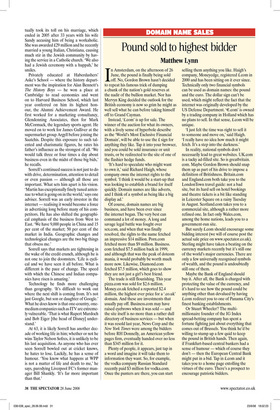Pound sold to highest bidder
Matthew Lynn
In Amsterdam, on the afternoon of 26 June, the pound is finally being sold off. No, Gordon Brown hasn’t decided to repeat his famous trick of dumping a chunk of the nation’s gold reserves at the nadir of the bullion market. Nor has Mervyn King decided the outlook for the British economy is now so grim he might as well sell what he can before taking himself off to Grand Cayman.
Instead, ‘£.com’ is up for sale. The winner of the auction for what its owners, with a lively sense of hyperbole describe as the ‘World’s Most Exclusive Financial Domain’, will be able to use the £ sign for anything they like. Tap it into your browser, and you could be sold insurance or unit trusts, or be redirected to the site of one of the flashier hedge funds.
‘It’s hard to speculate who might want to own it,’ said Richard Haigh, whose company owns the internet rights to the symbol. ‘I think it would be a start-up that was looking to establish a brand for itself quickly. Domain names are like adverts, and I think of a symbol as being like a big display ad.’ Of course, domain names are big business, and have been ever since the internet began. The very best can command a lot of money. A long and savage legal battle was fought over sex.com, and when that was finally resolved, the rights to the name fetched an impressive $14 million. Porn.com fetched more than $9 million. Business. com fetched $7.5 million back in 1999, and although that was the peak of dotcom mania, it would probably be worth much more now. Likewise, Diamond.com fetched $7.5 million, which goes to show they are not just a girl’s best friend.
The trade is still flourishing. This year pizza.com was sold for $2.6 million. Money.co.uk fetched a reported $2.4 million, the highest ever price for a ‘.co.uk’ domain. And these are investments that usually pay off. Business.com may have raised eyebrows when it was sold — and the site itself is no more than a rather dull directory of business services — but when it was resold last year, News Corp and the New York Times were among the bidders before RH Donnelly, an American yellow pages firm, eventually handed over no less than $345 million for it.
Plenty of people, it appears, just tap in a word and imagine it will take them to information they want. So, for example, the vodka company Russian Standard recently paid $3 million for vodka.com. Once the punters are there, you can start selling them anything you like. Haigh’s company, Moneyedge, registered £.com in 2000 and has been sitting on it ever since. Technically only two financial symbols can be used as domain names: the pound and the euro. The dollar sign can’t be used, which might reflect the fact that the internet was originally developed by the US Defense Department. ‘€.com’ is owned by a trading company in Holland which has no plans to sell. In that sense, £.com will be unique.
‘I just felt the time was right to sell it to someone and move on,’ said Haigh. ‘I really have no idea how much it might fetch. It’s a step into the darkness.’ In reality, national symbols don’t necessarily lead to great websites. UK.com is a tacky ad-filled site. So is greatbritain. com. Maybe Gordon Brown should snap them up as part of his drive to impose a definition of Britishness. Britain.com and England.com both take you to the LondonTown travel guide: not a bad site, but its hard sell on hotel bookings and theatre tickets is a bit like standing in Leicester Square on a rainy Tuesday in August. Scotland.com takes you to a commercial site, although a rather more refined one. In fact only Wales.com, among the home nations, leads you to a government-run site.
But surely £.com should encourage some bidding interest (we will of course post the actual sale price on www.spectator.co.uk). Sterling might have taken a beating on the currency markets recently but it’s still one of the world’s major currencies. There are only a few universally recognised symbols of wealth, and the pound is undoubtedly still one of them.
Maybe the Bank of England should buy it. After all, the Bank is charged with protecting the value of the currency, and it’s hard to see how the pound could be anything other than devalued by having £.com redirect you to one of Panama City’s finest banking establishments.
Or Stuart Wheeler? The multimillionaire founder of the IG Index spread-betting company has spent a fortune fighting just about everything that comes out of Brussels. You think he’d be willing to stump up a few quid to keep the pound in British hands. Then again, if Frankfurt-based central bankers had a sense of humour — which of course they don’t — then the European Central Bank might put in a bid. Tap in £.com and it takes you to a home page extolling the virtues of the euro. There’s a prospect to encourage patriotic bidders.


















































































 Previous page
Previous page